外研版(2019)必修第二册Unit 1 Food for thought Undersdanding ideas课件(共45张PPT)
文档属性
| 名称 | 外研版(2019)必修第二册Unit 1 Food for thought Undersdanding ideas课件(共45张PPT) | 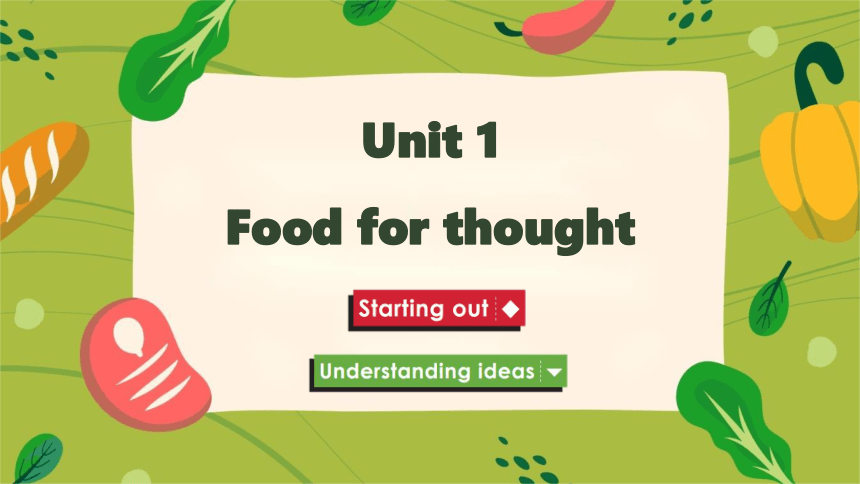 | |
| 格式 | pptx | ||
| 文件大小 | 99.1MB | ||
| 资源类型 | 教案 | ||
| 版本资源 | 外研版(2019) | ||
| 科目 | 英语 | ||
| 更新时间 | 2024-07-22 14:59:11 | ||
图片预览

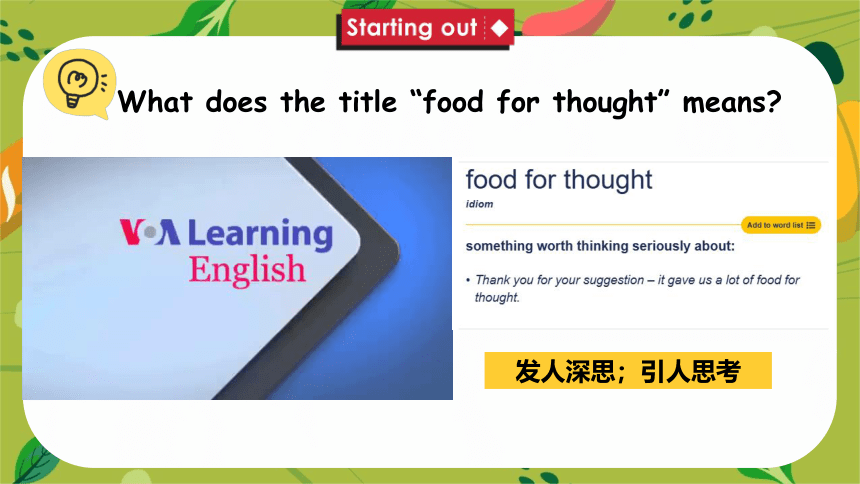
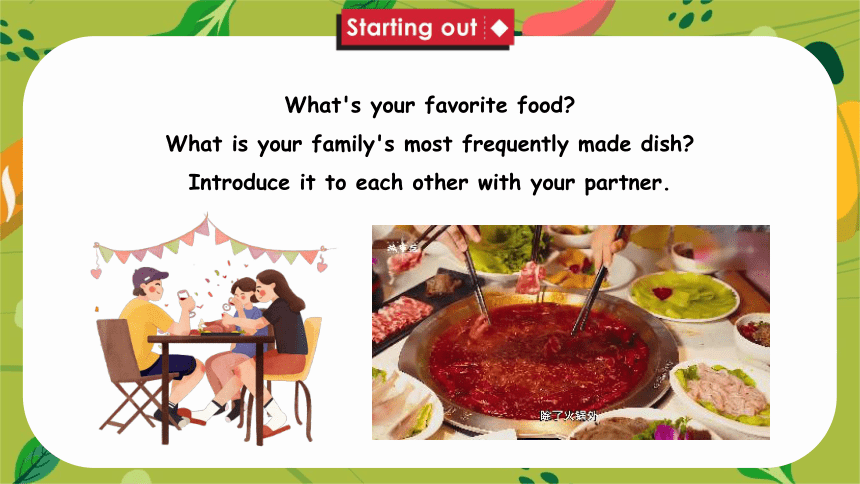
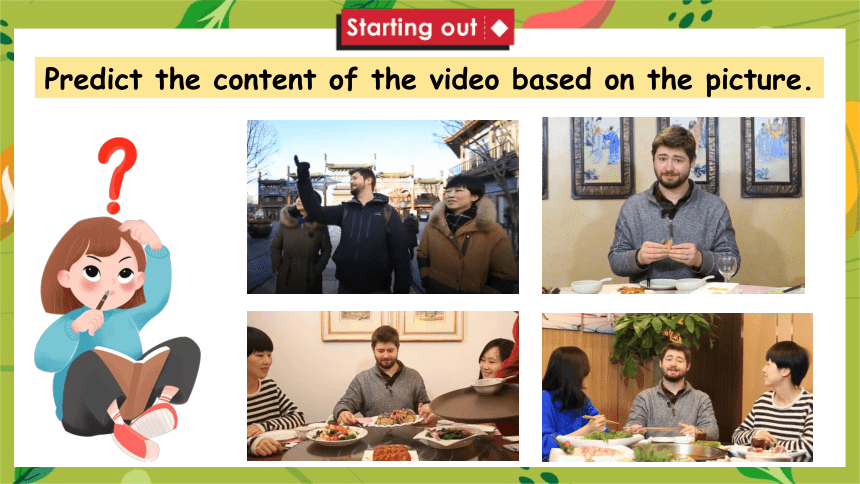
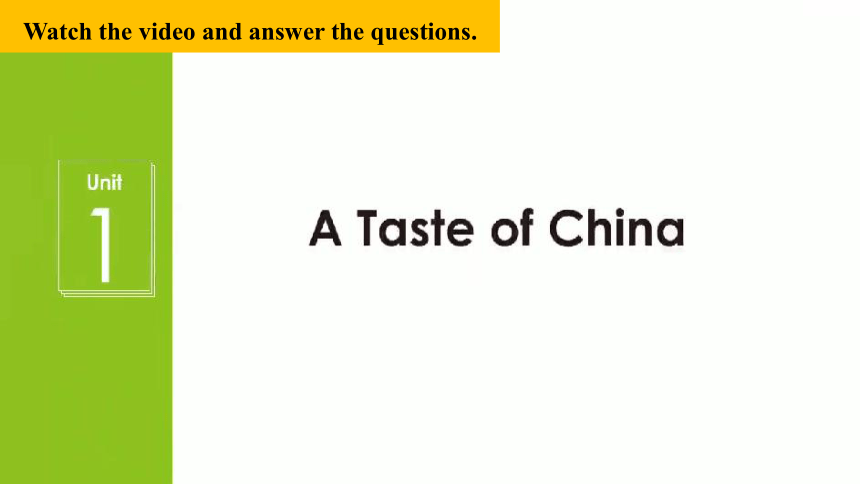

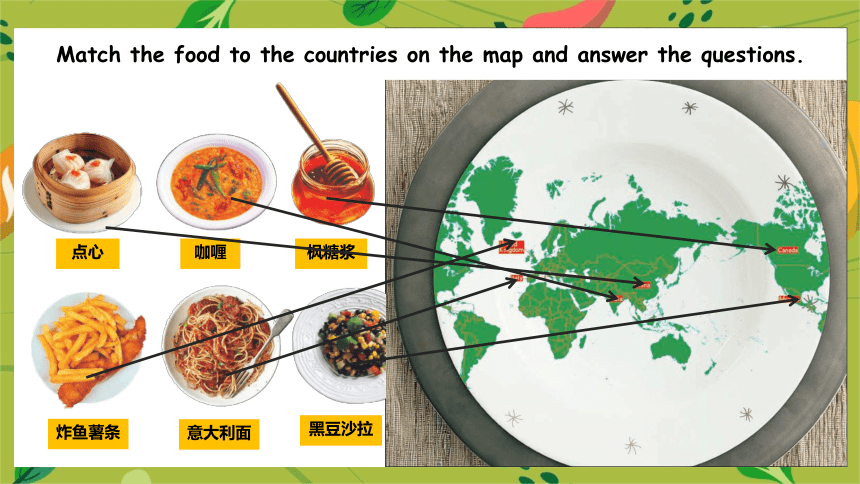

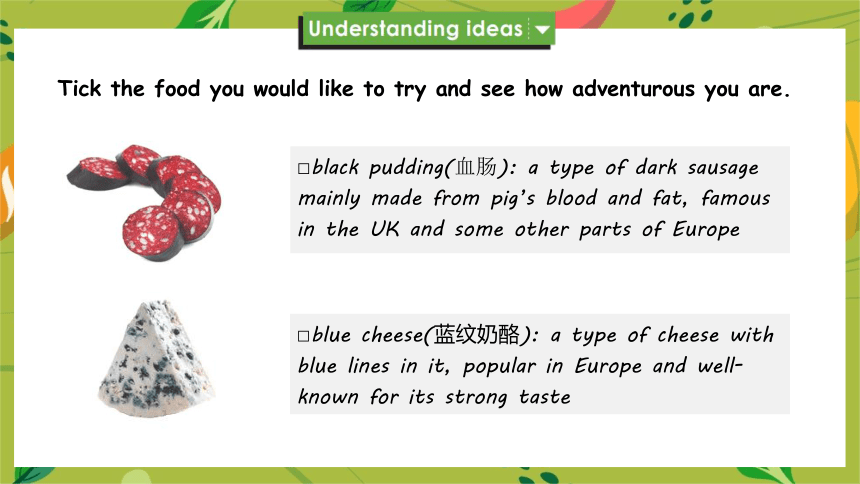
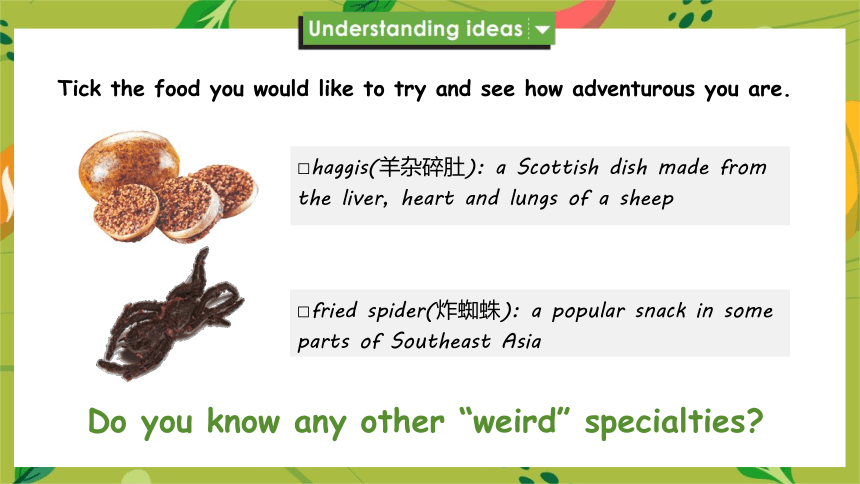
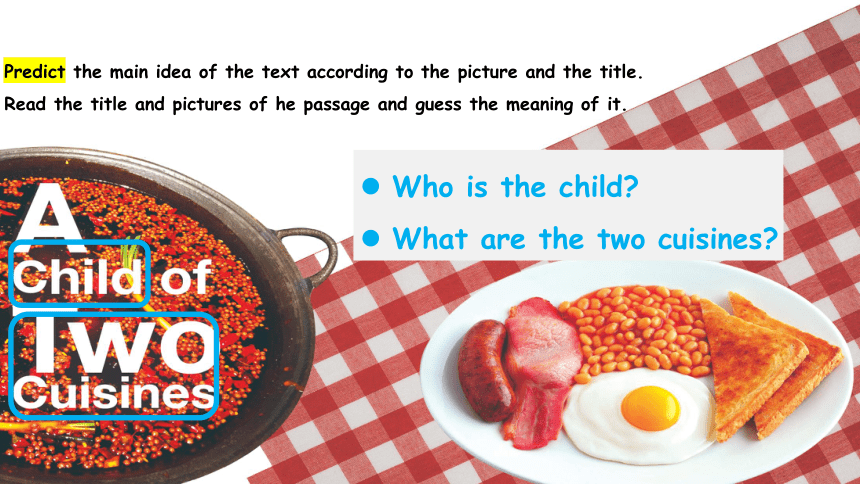
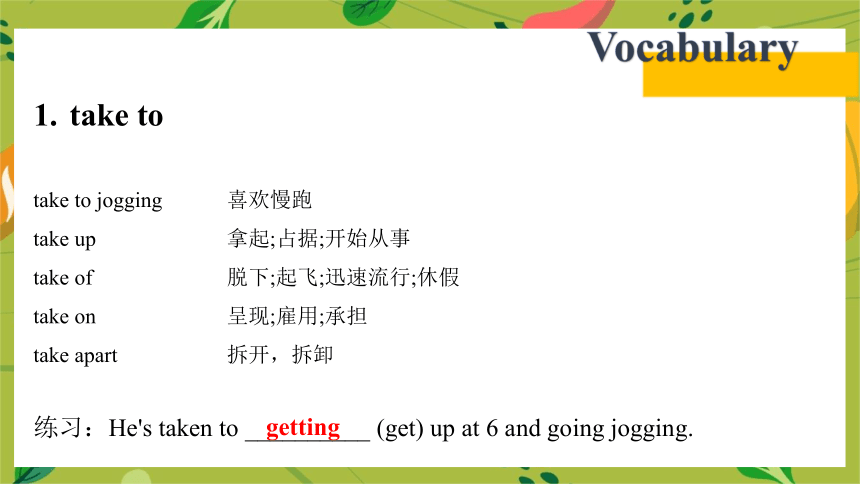
文档简介
(共45张PPT)
Unit 1
Food for thought
What does the title “food for thought” means
发人深思;引人思考
What's your favorite food
What is your family's most frequently made dish Introduce it to each other with your partner.
Predict the content of the video based on the picture.
Watch the video and answer the questions.
Watch the video and answer the questions.
1. What different types of food are introduced in the video
2. Have you ever tried any of the food in the video What did you think of it
Beijing duck Dazhaxie Sichuan hot pot
Match the food to the countries on the map and answer the questions.
点心
咖喱
枫糖浆
炸鱼薯条
意大利面
黑豆沙拉
1. Have you ever tried any of the food in the pictures Which would you most like to try
2. What food from other countries have you tried
Tick the food you would like to try and see how adventurous you are.
□black pudding(血肠): a type of dark sausage mainly made from pig’s blood and fat, famous in the UK and some other parts of Europe
□blue cheese(蓝纹奶酪): a type of cheese with blue lines in it, popular in Europe and well-known for its strong taste
Tick the food you would like to try and see how adventurous you are.
□haggis(羊杂碎肚): a Scottish dish made from the liver, heart and lungs of a sheep
□fried spider(炸蜘蛛): a popular snack in some parts of Southeast Asia
Do you know any other “weird” specialties
Predict the main idea of the text according to the picture and the title.
Read the title and pictures of he passage and guess the meaning of it.
Who is the child
What are the two cuisines
Vocabulary
take to
take to jogging 喜欢慢跑
take up 拿起;占据;开始从事
take of 脱下;起飞;迅速流行;休假
take on 呈现;雇用;承担
take apart 拆开,拆卸
练习:He's taken to __________ (get) up at 6 and going jogging.
getting
Vocabulary
2. sort
all sorts/kinds of 各种各样的(名词前)
of all sorts 各种各样的(名词后)
this/that sort of 这/那种的(名词前)
of this/that sort 这/那种的(名词后)
sort of= kind of 有几分,有点儿(用于动词或形容词之前作状语,表程度 )
sort...by... 把……按……分类
sort... into... 把……分成……
sort out 分类,整理;挑出;解决
练习:After supper, we would play card games of all __________ (sort) in the sitting room.
sorts
Vocabulary
3. typical
a typical example 典型例子
a typical feature 典型的特征
be typical of 具有……的特点;是……的典型
It is typical of sb.to do sth. 某人一向……是某人的特点
练习:This poem is typical __________ the Romantic period.
of
Vocabulary
4. suffer
suffer pain/hardship 遭受疼痛/遭受困苦
suffer losses/damage 遭受损失/遭受损害
suffer poverty/hunger 遭受贫穷/饥俄
suffer from ill health 身体不好
suffer from food/drought 遭受水灾/遭受早灾
suffer from shock 陷入休克状态
suffer from stress 承受压力,有精神压力
练习:Many young people suffer __________ stress both from home and work.
from
Vocabulary
5. come across
come across an old friend 碰到了一位老朋友
come across this book in an old bookstore在一家旧书店里发现了这本书
练习:She came __________ an old friend of hers yesterday while she was shopping at the department store.
across
Vocabulary
6. horrible
horror n.惊骇,惨状,极端厌恶,令人恐怖的事物
be horrible tosb. 对某人很粗鲁
have a horrible feeling (that...) 有种不好的感觉···.··
horrible weather 糟透了的天气
ahorrible smell 极难闻的气味
a horrible dream 噩梦
练习:We complained to the travel agency about the __________ (horror) service during our trip, but no one has responded now.
horrible
Vocabulary
7. gather
gather together 聚集起来,合拢
gather round/around 聚集,集合
gather...in 收割,收获
gather flowers/crops 采花/收庄稼
gather information/evidence 搜集信息/证据
gather up 收集
练习:People __________ (gather) round, curious to know what was happening.
gathered
Vocabulary
8. remind...of...
remind sb. of sth. 使某人想起某事/某物
remind sb.to do sth 提醒某人做某事
remind sb. that/how... 提醒某人……
练习:The old photos reminded me __________ the days I spent in the countryside.
of
Vocabulary
9. poison
poison...with sth. 用……毒害……
food poisoning 食物中毒
What's your poison 你喜欢喝什么酒
练习:The cruel man killed his wife by ____________ (poison) her coffee.
poisoning
What is the main idea of the passage
A.How the family stays healthy by eating Chinese food.
B.What the family has done to promote Chinese food.
C.How the family cooks both Chinese and English food.
D.How the family combines food from two cultures.
Read the text quickly to match the main idea with each part.
Part 1 (Para. 1) A.The author feels at home with cross-cultural food.
Part 2 (Paras. 2-5) B.The author’s birth background.
Part 3 (Para. 6) C.The family’s attitude to different foods.
Narration
What is the style of the passage?
Answer the following questions to confirm your prediction.
Who is the child
What are the two cuisines
Why is he “a child of two cuisines”
The child is a kid growing up in England with a British father and a Chinese mother.
Chinese cuisine and British cuisine.
Because he has enjoyed food from both China and Britain.
Read the passage carefully and choose the best answer.
1.Which of the following statements from the first two paragraphs is NOT true
A. The food from my mother’s is sweet.
B. The writer’s father still dare not try chicken feet.
C. The writer can use not only a knife and fork but also chopsticks
D. The writer’s mother comes from China while his father is from Britain.
2. Which of the following doesn’t the father dare to eat
A. hot pot B. chicken feet C. stinky tofu D. Sunday roast
3. What is the mum’s view about eating too much roast food
A. It makes us suffer from heat inside our bodies.
B. It makes us feel happy.
C. It makes us have sweet memories of the food.
D. It makes us feel at home.
4. What’s the author’s attitude towards food from the two cultures
He prefers to eat British food rather than Chinese food.
He agrees with the proverb“ One man’s meat is another man’s poison.
He feels at home with food from his two cultures.
He has taken to eating Chinese food. .
Family Members
A Chinese from Sichuan
A British
A cross-cultural boy
I ______________ food from both my cultures.
a British father
a Chinese mother
______________________________
A Child of Two Cuisines
______________, Animal parts, Stinky tofu
________________
C____________ cusines
British cuisine/food
Full British breakfast
Sunday roast
Sichuan hot pot
ross-cultural
feel at home with
Chinese cuisine/food
Growing up in England with a British father and a Chinese mother, I've enjoyed food from both countries ever since l was able to hold a knife and fork-and chopsticks!
现在分词短语作状语
现在分词短语作状语表示时间、原因、条件、让步、结果、方式或伴随等。可以转化为相应的状语从句或并列句。
现在分词短语作状语
(1) 现在分词短语在句中作状语,表示时间、条件、原因、结果、方式或伴随时,其逻辑主语必须与句子的主语保持一致。
(2) 从分词的时间意义上看,现在分词的一般式表示的动作与谓语动词表示的动作同时发生或几乎同时发生;现在分词的完成式表示的动作发生在谓语动词表示的动作之前。
(3) 从语态意义上看,现在分词往往表示主动的动作,句子主语是分词动作的执行者,其否定形式是在前面加not。
现在分词短语作状语
Being sick, I have been staying at home for nearly two weeks. (原因状语)
我因病待在家中接近两周了。
Hearing the news, Jim jumped for joy. (时间状语)
听了这消息时,吉姆高兴得跳了起来。
A number of new machines were equipped in the factory, thus resulting in an increase in production. (结果状语)
这家工厂安装了许多新机器,因而增加了生产。
Working hard, you will succeed. (条件状语)
如果努力工作,你就可以成功。
现在分词短语作状语
辨析:
(1)现在分词短语作结果状语时,一般表示“顺理成章”的结果。
(2)不定式短语作结果状语时,表示“意料之外或不愉快”的结果。
Their car was caught in a traffic jam, thus causing the delay.
他们的车遇上交通阻塞,因而耽误了。
Tom got to the station, only to find the train had gone.
汤姆到达车站,却发现火车已经开走了。
He must have thought I was joking.
must have done结构
(1)在肯定句中“must (could, may, might)+have done”结构用来表示对过去的推测,但程度依次减弱。
It must have rained last night, for the ground is wet.
昨晚一定下雨了,因为地面还是湿的。
He must have been to the island, for he knows a lot about it.
他一定去过这个岛,因为他对它非常了解。
must have done结构
(2)对过去的否定推测用can't/couldn't have done。
He can't have worked at the office last night, for he had to go to a party at 6:00pm.
昨晚他不可能在办公室工作,因为(昨天)晚上六点他得参加一个聚会。
Mr. Smith can't have gone to Beijing, for I saw him in the library just now.
史密斯先生不可能去北京了,因为我刚才在图书馆见过他。
情态动词+have done
其他“情态动词+have done”的用法
(1)should/ought to have done 本应该做……(而没做)
should not/ought not to have done本不应该做……(而做了)
—Sorry, Mum! I failed the job interview again.
对不起,妈妈!我面试又失败了。
—Oh, it's too bad. You should have made full preparations.
哦,太糟糕了。你本应该做好充分的准备的。
情态动词+have done
(2)can/could have done本能够去做却没有做(用于疑问句或否定句中,表示对行为可能性的推测 )
can't/couldn't have done只表示对过去否定的推测
He could have passed the exam, but he was too careless.
本来他能够通过考试,但是他太粗心。
Without his wartime experiences, Hemingway couldn't have written his famous novel A Farewell to Arms.
没有战争经历.海明威就不可能写出他著名的小说《永别了,武器》。
情态动词+have done
(3)may/might have done 其实(本来)可以 (表示对过去情况不确定的推测,常用于肯定句,不用于疑问句;另外might have done 还可表示委婉的责备)
You might have given him more help, though you were busy.
尽管你很忙,其实你本可以多帮助他一下。
(4)needn't have done 本来不必做(却做了)(表示种不必要的过去行为,一般用于否定句或疑问句)
I needn't have worried before I came to the new school, for my classmates here are very friendly to me.
来新学校前,我本不必担心的,因为这儿的同学对我都很友好。
What does the author mean by saying “one man’s meat is another man’s poison” Do you know of any similar sayings in Chinese
What food from other regions in China or other countries has made an impression on you Why
Think & share
萝卜青菜各有所爱。
Exercise
1. We are happy that our predictions________ be so accurate, which is far from expectation.
A. may B. would C. should D. will
2. It ________be the headmaster. He has gone to America.
A. mustn't B. can't C. may not D. wouldn't
3. Occasionally, small asteroids strike Earth. These cause little damage. Major collision, such as the one that_________ the dinosaurs, occur rarely--perhaps only once every 100 million years.
A. may have killed B. should have killed
C. must have killed D. could have killed
Exercise
4. “How dare you ________ that to me ” the man said angrily ________ to the boy.
A. to say; pointed B. say; to point C. say; pointing D. to say; to point
5. – Sir, all the reporters have arrived. ________ they wait outside or come in
– Send them in.
A. Will B. Must C. Shall D. Ought
6. If you don 't have a guide, you________ lose your way.
A. must B. dare C. should D. could
7. In today's information age, the loss of data ________ cause serious problems for a company.
A. need B. should C. can D. must
8. The ground is wet. It ________ have rained last night.
A. will B. must C. should D. may
9. —Let's__________ to the movie!
—I am sorry, I must__________ my homework first.
A. going; do B. go; doing C. go; do D. going; doing
10. You ________ worry about him. He will get well soon.
A. needn't B. can't C. mustn't D. may not
Exercise
Review the language points and complete the exercises.
Find more examples of cross-culture on the Internet and share them with the classmates next class.
Homework
See you next class!
Unit 1
Food for thought
What does the title “food for thought” means
发人深思;引人思考
What's your favorite food
What is your family's most frequently made dish Introduce it to each other with your partner.
Predict the content of the video based on the picture.
Watch the video and answer the questions.
Watch the video and answer the questions.
1. What different types of food are introduced in the video
2. Have you ever tried any of the food in the video What did you think of it
Beijing duck Dazhaxie Sichuan hot pot
Match the food to the countries on the map and answer the questions.
点心
咖喱
枫糖浆
炸鱼薯条
意大利面
黑豆沙拉
1. Have you ever tried any of the food in the pictures Which would you most like to try
2. What food from other countries have you tried
Tick the food you would like to try and see how adventurous you are.
□black pudding(血肠): a type of dark sausage mainly made from pig’s blood and fat, famous in the UK and some other parts of Europe
□blue cheese(蓝纹奶酪): a type of cheese with blue lines in it, popular in Europe and well-known for its strong taste
Tick the food you would like to try and see how adventurous you are.
□haggis(羊杂碎肚): a Scottish dish made from the liver, heart and lungs of a sheep
□fried spider(炸蜘蛛): a popular snack in some parts of Southeast Asia
Do you know any other “weird” specialties
Predict the main idea of the text according to the picture and the title.
Read the title and pictures of he passage and guess the meaning of it.
Who is the child
What are the two cuisines
Vocabulary
take to
take to jogging 喜欢慢跑
take up 拿起;占据;开始从事
take of 脱下;起飞;迅速流行;休假
take on 呈现;雇用;承担
take apart 拆开,拆卸
练习:He's taken to __________ (get) up at 6 and going jogging.
getting
Vocabulary
2. sort
all sorts/kinds of 各种各样的(名词前)
of all sorts 各种各样的(名词后)
this/that sort of 这/那种的(名词前)
of this/that sort 这/那种的(名词后)
sort of= kind of 有几分,有点儿(用于动词或形容词之前作状语,表程度 )
sort...by... 把……按……分类
sort... into... 把……分成……
sort out 分类,整理;挑出;解决
练习:After supper, we would play card games of all __________ (sort) in the sitting room.
sorts
Vocabulary
3. typical
a typical example 典型例子
a typical feature 典型的特征
be typical of 具有……的特点;是……的典型
It is typical of sb.to do sth. 某人一向……是某人的特点
练习:This poem is typical __________ the Romantic period.
of
Vocabulary
4. suffer
suffer pain/hardship 遭受疼痛/遭受困苦
suffer losses/damage 遭受损失/遭受损害
suffer poverty/hunger 遭受贫穷/饥俄
suffer from ill health 身体不好
suffer from food/drought 遭受水灾/遭受早灾
suffer from shock 陷入休克状态
suffer from stress 承受压力,有精神压力
练习:Many young people suffer __________ stress both from home and work.
from
Vocabulary
5. come across
come across an old friend 碰到了一位老朋友
come across this book in an old bookstore在一家旧书店里发现了这本书
练习:She came __________ an old friend of hers yesterday while she was shopping at the department store.
across
Vocabulary
6. horrible
horror n.惊骇,惨状,极端厌恶,令人恐怖的事物
be horrible tosb. 对某人很粗鲁
have a horrible feeling (that...) 有种不好的感觉···.··
horrible weather 糟透了的天气
ahorrible smell 极难闻的气味
a horrible dream 噩梦
练习:We complained to the travel agency about the __________ (horror) service during our trip, but no one has responded now.
horrible
Vocabulary
7. gather
gather together 聚集起来,合拢
gather round/around 聚集,集合
gather...in 收割,收获
gather flowers/crops 采花/收庄稼
gather information/evidence 搜集信息/证据
gather up 收集
练习:People __________ (gather) round, curious to know what was happening.
gathered
Vocabulary
8. remind...of...
remind sb. of sth. 使某人想起某事/某物
remind sb.to do sth 提醒某人做某事
remind sb. that/how... 提醒某人……
练习:The old photos reminded me __________ the days I spent in the countryside.
of
Vocabulary
9. poison
poison...with sth. 用……毒害……
food poisoning 食物中毒
What's your poison 你喜欢喝什么酒
练习:The cruel man killed his wife by ____________ (poison) her coffee.
poisoning
What is the main idea of the passage
A.How the family stays healthy by eating Chinese food.
B.What the family has done to promote Chinese food.
C.How the family cooks both Chinese and English food.
D.How the family combines food from two cultures.
Read the text quickly to match the main idea with each part.
Part 1 (Para. 1) A.The author feels at home with cross-cultural food.
Part 2 (Paras. 2-5) B.The author’s birth background.
Part 3 (Para. 6) C.The family’s attitude to different foods.
Narration
What is the style of the passage?
Answer the following questions to confirm your prediction.
Who is the child
What are the two cuisines
Why is he “a child of two cuisines”
The child is a kid growing up in England with a British father and a Chinese mother.
Chinese cuisine and British cuisine.
Because he has enjoyed food from both China and Britain.
Read the passage carefully and choose the best answer.
1.Which of the following statements from the first two paragraphs is NOT true
A. The food from my mother’s is sweet.
B. The writer’s father still dare not try chicken feet.
C. The writer can use not only a knife and fork but also chopsticks
D. The writer’s mother comes from China while his father is from Britain.
2. Which of the following doesn’t the father dare to eat
A. hot pot B. chicken feet C. stinky tofu D. Sunday roast
3. What is the mum’s view about eating too much roast food
A. It makes us suffer from heat inside our bodies.
B. It makes us feel happy.
C. It makes us have sweet memories of the food.
D. It makes us feel at home.
4. What’s the author’s attitude towards food from the two cultures
He prefers to eat British food rather than Chinese food.
He agrees with the proverb“ One man’s meat is another man’s poison.
He feels at home with food from his two cultures.
He has taken to eating Chinese food. .
Family Members
A Chinese from Sichuan
A British
A cross-cultural boy
I ______________ food from both my cultures.
a British father
a Chinese mother
______________________________
A Child of Two Cuisines
______________, Animal parts, Stinky tofu
________________
C____________ cusines
British cuisine/food
Full British breakfast
Sunday roast
Sichuan hot pot
ross-cultural
feel at home with
Chinese cuisine/food
Growing up in England with a British father and a Chinese mother, I've enjoyed food from both countries ever since l was able to hold a knife and fork-and chopsticks!
现在分词短语作状语
现在分词短语作状语表示时间、原因、条件、让步、结果、方式或伴随等。可以转化为相应的状语从句或并列句。
现在分词短语作状语
(1) 现在分词短语在句中作状语,表示时间、条件、原因、结果、方式或伴随时,其逻辑主语必须与句子的主语保持一致。
(2) 从分词的时间意义上看,现在分词的一般式表示的动作与谓语动词表示的动作同时发生或几乎同时发生;现在分词的完成式表示的动作发生在谓语动词表示的动作之前。
(3) 从语态意义上看,现在分词往往表示主动的动作,句子主语是分词动作的执行者,其否定形式是在前面加not。
现在分词短语作状语
Being sick, I have been staying at home for nearly two weeks. (原因状语)
我因病待在家中接近两周了。
Hearing the news, Jim jumped for joy. (时间状语)
听了这消息时,吉姆高兴得跳了起来。
A number of new machines were equipped in the factory, thus resulting in an increase in production. (结果状语)
这家工厂安装了许多新机器,因而增加了生产。
Working hard, you will succeed. (条件状语)
如果努力工作,你就可以成功。
现在分词短语作状语
辨析:
(1)现在分词短语作结果状语时,一般表示“顺理成章”的结果。
(2)不定式短语作结果状语时,表示“意料之外或不愉快”的结果。
Their car was caught in a traffic jam, thus causing the delay.
他们的车遇上交通阻塞,因而耽误了。
Tom got to the station, only to find the train had gone.
汤姆到达车站,却发现火车已经开走了。
He must have thought I was joking.
must have done结构
(1)在肯定句中“must (could, may, might)+have done”结构用来表示对过去的推测,但程度依次减弱。
It must have rained last night, for the ground is wet.
昨晚一定下雨了,因为地面还是湿的。
He must have been to the island, for he knows a lot about it.
他一定去过这个岛,因为他对它非常了解。
must have done结构
(2)对过去的否定推测用can't/couldn't have done。
He can't have worked at the office last night, for he had to go to a party at 6:00pm.
昨晚他不可能在办公室工作,因为(昨天)晚上六点他得参加一个聚会。
Mr. Smith can't have gone to Beijing, for I saw him in the library just now.
史密斯先生不可能去北京了,因为我刚才在图书馆见过他。
情态动词+have done
其他“情态动词+have done”的用法
(1)should/ought to have done 本应该做……(而没做)
should not/ought not to have done本不应该做……(而做了)
—Sorry, Mum! I failed the job interview again.
对不起,妈妈!我面试又失败了。
—Oh, it's too bad. You should have made full preparations.
哦,太糟糕了。你本应该做好充分的准备的。
情态动词+have done
(2)can/could have done本能够去做却没有做(用于疑问句或否定句中,表示对行为可能性的推测 )
can't/couldn't have done只表示对过去否定的推测
He could have passed the exam, but he was too careless.
本来他能够通过考试,但是他太粗心。
Without his wartime experiences, Hemingway couldn't have written his famous novel A Farewell to Arms.
没有战争经历.海明威就不可能写出他著名的小说《永别了,武器》。
情态动词+have done
(3)may/might have done 其实(本来)可以 (表示对过去情况不确定的推测,常用于肯定句,不用于疑问句;另外might have done 还可表示委婉的责备)
You might have given him more help, though you were busy.
尽管你很忙,其实你本可以多帮助他一下。
(4)needn't have done 本来不必做(却做了)(表示种不必要的过去行为,一般用于否定句或疑问句)
I needn't have worried before I came to the new school, for my classmates here are very friendly to me.
来新学校前,我本不必担心的,因为这儿的同学对我都很友好。
What does the author mean by saying “one man’s meat is another man’s poison” Do you know of any similar sayings in Chinese
What food from other regions in China or other countries has made an impression on you Why
Think & share
萝卜青菜各有所爱。
Exercise
1. We are happy that our predictions________ be so accurate, which is far from expectation.
A. may B. would C. should D. will
2. It ________be the headmaster. He has gone to America.
A. mustn't B. can't C. may not D. wouldn't
3. Occasionally, small asteroids strike Earth. These cause little damage. Major collision, such as the one that_________ the dinosaurs, occur rarely--perhaps only once every 100 million years.
A. may have killed B. should have killed
C. must have killed D. could have killed
Exercise
4. “How dare you ________ that to me ” the man said angrily ________ to the boy.
A. to say; pointed B. say; to point C. say; pointing D. to say; to point
5. – Sir, all the reporters have arrived. ________ they wait outside or come in
– Send them in.
A. Will B. Must C. Shall D. Ought
6. If you don 't have a guide, you________ lose your way.
A. must B. dare C. should D. could
7. In today's information age, the loss of data ________ cause serious problems for a company.
A. need B. should C. can D. must
8. The ground is wet. It ________ have rained last night.
A. will B. must C. should D. may
9. —Let's__________ to the movie!
—I am sorry, I must__________ my homework first.
A. going; do B. go; doing C. go; do D. going; doing
10. You ________ worry about him. He will get well soon.
A. needn't B. can't C. mustn't D. may not
Exercise
Review the language points and complete the exercises.
Find more examples of cross-culture on the Internet and share them with the classmates next class.
Homework
See you next class!
